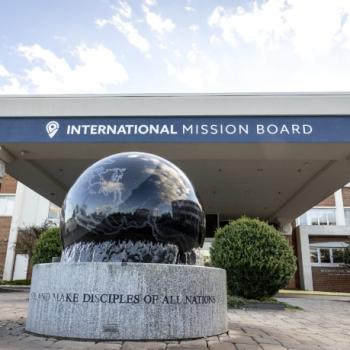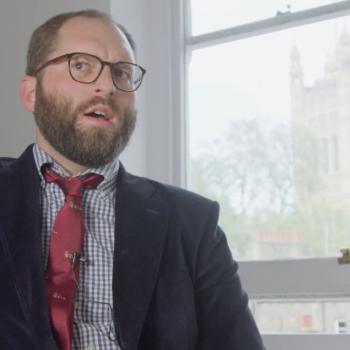". . . never be misled by others. Whether you're facing inward or facing outward, whatever you meet up with, just kill it! If you meet a Buddha, kill the Buddha. If you meet a patriarch, kill the patriarch. If you meet an arhat, kill the arhat. If you meet your parents, kill your parents. If you meet your kinfolk, kill your kinfolk. Then for the first time you will gain emancipation, will not be entangled with things, will pass freely anywhere you wish to go." ~ Lin Chi Lu
The title of this particular installment of "Queer I Stand" may sound like some strange and spooky Lovecraft tale of eldritch horrors summoned by the sickening light of gibbous moons. But, even independent of the column being nothing like that, the title also captures something that I suspect is a lurking and dreadful fear in the bottom of many people's hearts, including my own. Let me explain.
Here at Patheos, most people associate November with the secular holiday of Thanksgiving. (I associate it with the Natalis Antinoi, the visit to the Colossoi of Memnon, and International Trans Day of Remembrance . . . but only a very small number of others also do.) Patheos bloggers and columnists have been asked to write about the elders or teachers who have inspired us most and for whom we are thankful. I'm very mindful at all times of giving thanks to those who deserve it, and who have impacted my life in a variety of important ways. The acknowledgement sections of my books, and even footnotes of some of my articles, attest to this mindfulness and spirit of gratitude that, I think, is at the heart of every spiritual path. Giving thanks, whether to gods, ancestors, land spirits, animals and plants, spiritual teachers in one's lineage, or one's community is an inherently religious activity that forms the basis for most ritual and the marking of most holy days. Any form of spirituality that moves away from this sort of activity probably does so at its peril.
And yet, when I look at my own spiritual path and my devotion to Antinous, I don't see a long list of potential advisors, seniors, and teachers who influenced me in it directly. A great deal of my success, and all of my failures, have not been under the guidance of others, but instead under the guidance of Antinous and the gods associated with him, and under my own most divine nature and its inspirations.
Two individuals ended up leading me to my Antinoan devotional path; and yet, neither of them really taught me much along the way. I was (and remain) very grateful for the friendship and peerage that I shared with one of them, and still share (despite the fact that the individual in question is now an atheist). While I cannot forget the role of the other in my devotional life, his presence was more of a hindrance than a help, and was often more of a bane than a balm in pursuing a useful, effective, and productive path in devotion to this god and his associates. Under his influence, the modern cultus of Antinous was becoming a cult of personality, rather than a cultus of divinity. It was for that reason that I decided to schism from that original movement and group that I helped to found, and to strike out on my own with the Ekklesía Antínoou—though I was not alone in that endeavor for very long.
Since then, I have gone on to do many of the greatest things I have yet done in terms of my public and private devotions with Antinous: writing my blog (as well as this column at Patheos!), publishing six books, holding regular rituals and workshops at PantheaCon and one at the Esoteric Book Conference, initiating people into Antinous' Mysteries, creating alliances with a variety of other groups, and in various other ways providing both online and in-person spiritual community and activities for interested people.
Though the work has been difficult, time-consuming, and often thankless, the part of it that was the most difficult was the part that started it all: having the strength and courage to stand up, say "I want no part of this any longer," and walking out from the other group (thus fomenting the schism that followed). It was not done simply to stir drama or to draw attention to myself; it was done because the things that were most important to me could not have been done under the auspices or the umbrella of the other group. The pay-off for having to put up with so much that I didn't agree with or thought was not useful was far too low for the amount of stress and energy that was involved in doing so. Any successes or failures that have followed from that time have been due to my own efforts or lack thereof, and having such a huge level of personal responsibility is both tremendously daunting but also superlatively rewarding, even in failure.
The initial fears I had to contend with were ones that I still struggle with a great deal. Who am I to be doing any of this? What do I really have to contribute to such an important and large task as re-building the foundations of the cultus of Antinous and his various divine associates? Why would anyone consider what I have to say on these matters at all important or useful? Can I really be a "leader"? I had been running from leadership roles for several years while under the umbrella of the previous group, and preferred to be an advisor and an information-provider rather than having a position of true leadership. By supporting someone who wasn't actually a fit leader and hoping I could lead from the back rather than from the front, I was very much a part of the problem. When I was able to admit that, and to realize that the only way forward for me was to step out of the shelter of what I had helped to create before, things became better.





